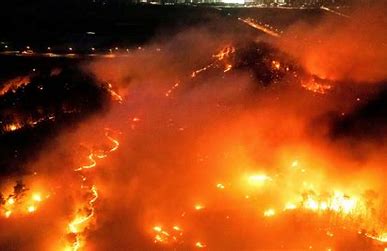

By Isha - Mar 27, 2025
South Korea is facing destructive wildfires due to its dry and windy climate, mountainous terrain, and human activities like negligence and arson. The rugged landscapes and dense vegetation make it challenging for firefighting teams to access affected areas quickly, leading to widespread destruction of forested areas and ecosystems. Despite efforts to control fires using advanced technologies and thousands of firefighters, logistical challenges persist due to harsh weather conditions and difficult terrain.

Yonhap via Reuters
LATEST
South Korea has recently been grappling with a series of devastating wildfires that have caused widespread destruction, raising concerns about the frequency and intensity of these blazes. The country's unique geographical features, climatic conditions, and human factors contribute to the severity of these wildfires, making them particularly challenging to control.
One of the primary reasons behind the devastating nature of wildfires in South Korea is its dry and windy climate, especially during spring and autumn. The combination of strong winds and low humidity creates the perfect conditions for fires to spread rapidly. March and April are considered peak wildfire seasons, as dry air and gusty winds can turn a small spark into a raging inferno within minutes.
Another contributing factor is the nation’s mountainous terrain, which covers nearly 70% of the country. These rugged landscapes make it difficult for firefighting teams to access affected areas quickly, allowing fires to burn uncontrolled for longer periods. The dense vegetation in these forests acts as fuel, further exacerbating the spread of fires. Wildfires not only destroy vast forested areas but also harm wildlife and ecosystems. The loss of vegetation leads to soil erosion and long-term environmental damage.
While natural causes like lightning strikes can ignite wildfires, human activities are a significant contributor. Negligence, such as the improper disposal of cigarette butts, agricultural burning, and unauthorized campfires, often leads to accidental ignitions. Additionally, urban expansion into forested areas has increased the risk of fires affecting residential communities. Firebreaks and early warning systems have been implemented, yet their efficiency is sometimes compromised by the unpredictable nature of wind-driven fires.
Arson has also been an issue in some cases, with individuals deliberately setting fires for various reasons, including land disputes or personal vendettas. Regardless of intent, human-caused wildfires have devastating consequences, endangering lives, property, and ecosystems. Despite having advanced firefighting technologies, South Korea faces logistical challenges in controlling large wildfires. The country deploys helicopters, drones, and thousands of firefighters, but harsh weather conditions and difficult terrain often hinder their effectiveness.